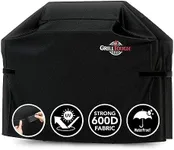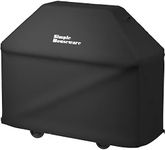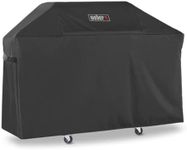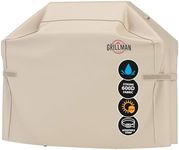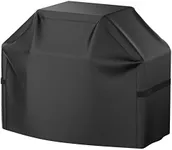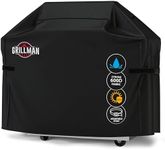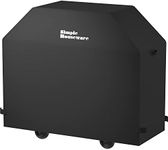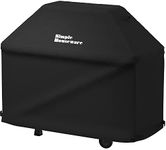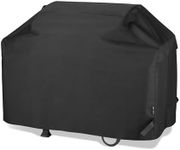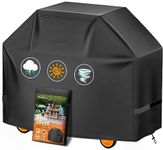Buying Guide for the Best Bbq Covers
Choosing the right BBQ cover is essential to protect your grill from the elements, extend its lifespan, and keep it looking good. A well-chosen cover shields your BBQ from rain, sun, dust, and even pests, making maintenance easier and ensuring your grill is always ready for use. When shopping for a BBQ cover, it's important to consider several key features that will help you find the best fit for your specific grill and environment.MaterialThe material of a BBQ cover determines how well it can protect your grill from weather and wear. Common materials include polyester, vinyl, and canvas. Polyester is lightweight and often treated to resist water and UV rays, making it a good all-around choice. Vinyl is highly waterproof but can become brittle in cold weather. Canvas is durable and breathable but may require extra waterproofing. If you live in a rainy area, prioritize waterproof materials. For sunny climates, UV resistance is key. Choose a material that matches your local weather and how often you use your grill.
Size and FitThe size and fit of the cover are crucial for effective protection. A cover that's too small won't shield the entire grill, while one that's too large can let in water and debris. BBQ covers come in various sizes, often labeled by grill type or dimensions. Measure your grill's width, depth, and height before shopping. Look for covers that match or slightly exceed these measurements. Some covers have adjustable straps or drawstrings for a snug fit, which is especially useful in windy areas. Always prioritize a close fit to maximize protection.
Weather ResistanceWeather resistance refers to how well the cover can withstand rain, sun, wind, and temperature changes. Features like water-resistant coatings, UV protection, and reinforced seams help a cover last longer and protect your grill better. If your BBQ stays outdoors year-round, look for covers with high weather resistance. In milder climates or if you store your grill under a roof, you may not need the most heavy-duty options. Think about your local weather patterns and how exposed your grill will be when choosing.
VentilationVentilation in a BBQ cover helps prevent moisture buildup, which can lead to mold, mildew, and rust. Some covers have built-in vents or mesh panels to allow air circulation while keeping rain out. If you live in a humid area or store your grill for long periods, ventilation is especially important. For short-term or occasional use, it may be less critical, but it's still a helpful feature to reduce condensation.
Ease of UseEase of use includes how simple it is to put on and remove the cover, as well as how easy it is to clean and store. Features like handles, lightweight materials, and simple fastening systems make daily use more convenient. If you use your grill frequently, look for a cover that's easy to handle. For seasonal storage, consider how compactly the cover can be folded and whether it comes with a storage bag.
Fastening and SecurityFastening and security features help keep the cover in place during wind or storms. Common options include straps, buckles, drawstrings, and elastic hems. If your grill is in an exposed or windy area, secure fastenings are essential to prevent the cover from blowing away. For sheltered locations, basic elastic hems may be sufficient. Choose the level of security based on how much wind and movement your cover will face.
